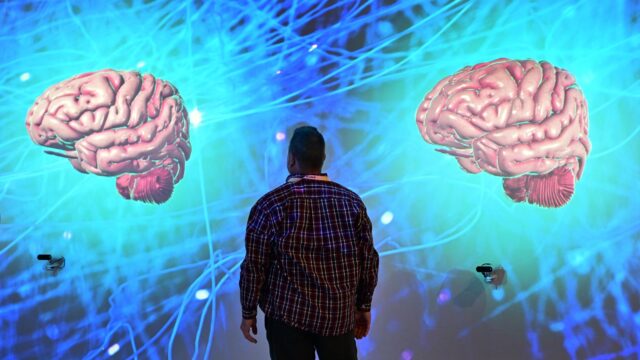According to New Scientist editor-in-chief Jim Janssen, there are rapid advances in neurotechnology. “New Scientist’s saying is ‘ideas that change the world’. When you look at AI in the world of medicine, that’s where the biggest strides are really being made.” According to Janssen, the brain is the most beautiful organ in the human body, but there is still a lot to discover.
BCI
“We are looking at how we can help a brain that is sick, for example due to amyotrophic lateral sclerosis, PTSD or cancer, through artificial intelligence,” Janssen says. Brain researcher Van Steensel is involved in neurotechnology. Brain-computer interface (BCI) is currently being developed. This is a device that reads brain signals and extracts relevant information from the brain using artificial intelligence. This information is then used to operate a computer. “A computer is a very general concept, and an example of this would be running a communication application on your computer,” Van Steensel says. “So that people who can no longer speak through their bodies can run a communication application via a brain signal.”
Sensors and signals
How do these sensors work? It is placed on the brain through a small hole or opening in the skull. “A simple example: When I move my hand, the signal changes in my mind. This can be translated into a mouse click,” Van Steensel explains. The most complex form is speech reading. “Then we look at the area of the brain responsible for mouth movements when speaking,” says the brain researcher. “There is no sound or movement, but we can use brain signals to determine what word someone is trying to say.”
“This would be a beautiful, intuitive way to talk to people who are completely paralyzed,” she says. Janssen agrees: “You do suffer from locked-in syndrome when you are paralyzed. With this technology, you will regain some of your freedom.”
research
Research into BCIs is interdisciplinary. “We need knowledge about the technology, the brain, and insight into the patients, their condition and their desires,” says Van Steensel. “You can never find all this knowledge in one person.” “We hear all sorts of things in the news about implantable neurotechnologies and brain control interfaces, but we don’t actually have the technology freely available at the moment. There is still a huge amount of research to be done.”
This research is not done overnight, it is still very difficult to find test subjects for this purpose. “Fortunately, there are a few people who are so seriously affected that they qualify.” Van Steensel also admits that the criteria for participating in the study are strict, in order to ensure patient safety, but she still sees a bright future for neurotechnology: “The steps that are being taken there are very hopeful.”
“Eureka,” Janssen says. “In other words, I’ve found it! Suppose you can suddenly speak.” According to Van Steensel, the development of implantable technology is happening very quickly. Janssen predicts that healthcare and technology are becoming increasingly personal. “I think it will translate to the individual in ten to twenty years.”

“Coffee buff. Twitter fanatic. Tv practitioner. Social media advocate. Pop culture ninja.”











More Stories
Which can cause an increase in nitrogen.
The Central State Real Estate Agency has no additional space to accommodate Ukrainians.
The oystercatcher, the “unlucky national bird,” is increasingly breeding on rooftops.